From San Sebastian to Seville, Spanish cities bewitch travelers with an intensity rarely seen outside of this corner of southwest Europe.
The best cities in Spain dazzle with layers of history and an abundance of food, music, art, football, and religious culture. They’re also typically centered around enchanting old quarters, full of twists and turns.
They’re also home to some of the world’s most wondrous architecture, from the Guggenheim Bilbao to the Sagrada Familia in Barcelona. You’ll find lively bars and traditional tapas restaurants, centuries-old churches and fortresses, and golden beaches that are among the finest in the world.
From the vast mainland to the glorious Canary Islands and Balearics, discover the 10 best cities to visit in Spain below.
Bilbao
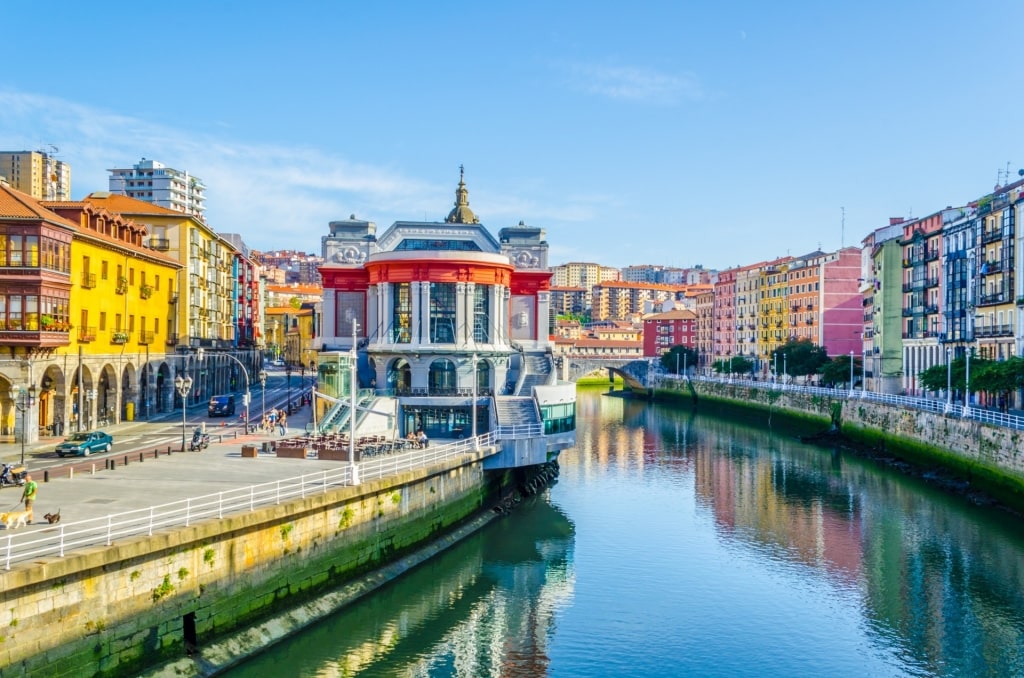
Casco Viejo, Bilbao
As far as cities in Spain go, Bilbao is superlative. Lying on the mainland’s north coast, Bilbao unravels on either side of the snaking Nervión River, a short distance inland.
Delve into Bilbao’s enthralling old town, Casco Viejo, in the center of the city, steeped in 700 years of history. You could visit the 14th-century gothic Cathedral of Bilbao and wander the charming Siete Calles, or Seven Streets, filled with boutiques, bars, and restaurants.
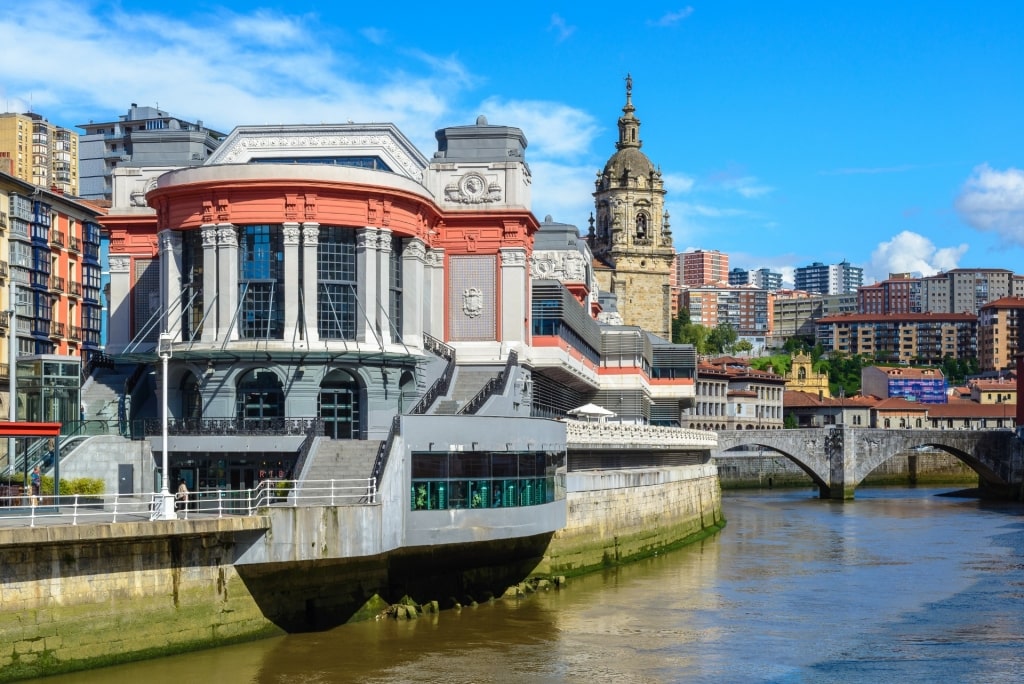
Ribera Market, Bilbao
For some of Spain’s most delicious souvenirs, visiting Ribera Market—the largest indoor food market in Europe—is one of the best things to do in Bilbao. The existing market, built in 1929, is a larder of the Basque Country and Bay of Biscay’s finest produce, from shellfish to olive oil and wine.
Bilbao has a modern side, too. Its big-hitting museum, the Guggenheim Bilbao, is an eye-popping architectural feast that has stood on the bank of the Nervión since 1997.
Designed by architect Frank Gehry, Guggenheim Bilbao features permanent and temporary exhibitions, showing artists such as Jeff Koons, Anish Kapoor, Yves Klein, and Mark Rothko.
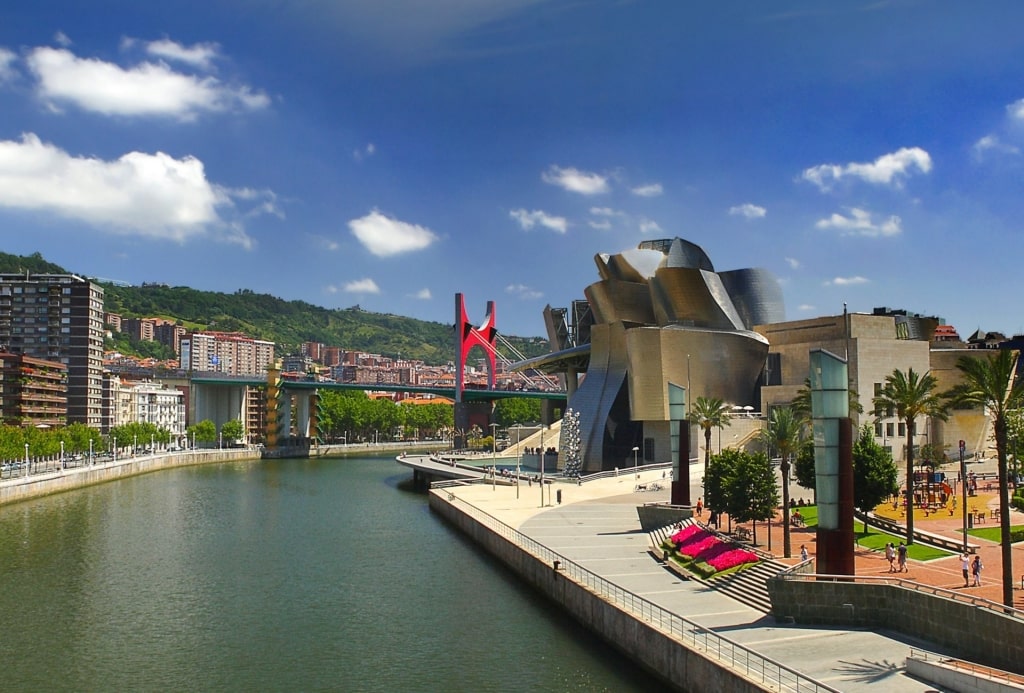
Guggenheim Bilbao
The museum’s daring design is what makes it one of the most beautiful places in Spain. Wander around the grounds to take it all in. Some of the most striking art pieces are located outside, too, including Klein’s Fire Fountain.
If you’re in the mood for relaxation, Bilbao has plenty of beaches close by. Choose from Playa de la Arena or Playa de Sopelana to see frothing Cantabrian waves crash onto the deep golden-hued sand.
Barcelona

La Sagrada Família, Barcelona
Barcelona offers fine museums, tantalizing gastronomy, world-beating shopping, and soft, sandy urban beaches, making it one of the best cities to visit in Spain.
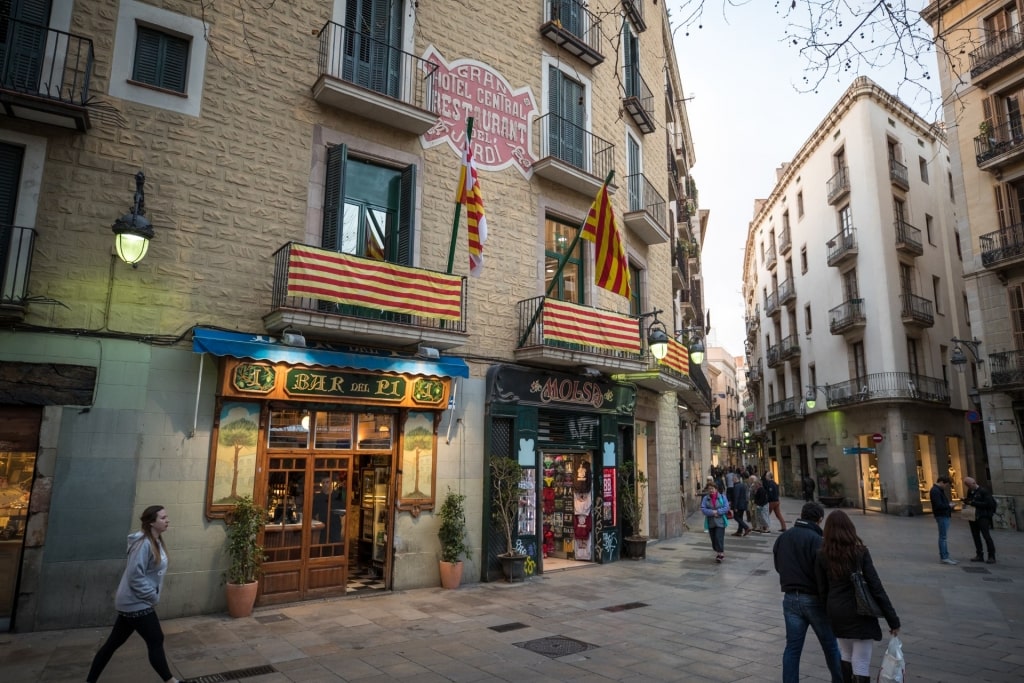
Gothic Quarter, Barcelona
Eschew the busy La Rambla to explore one of Barcelona’s best neighborhoods, the Gothic Quarter. Its twisting medieval streets are filled with tapas bars, boutiques, and historic landmarks, such as the towering Cathedral of Barcelona.
A number of Roman ruins can also be found in the Gothic Quarter, including the Temple of Augustus, the Roman Towers, former defensive walls, and an aqueduct.
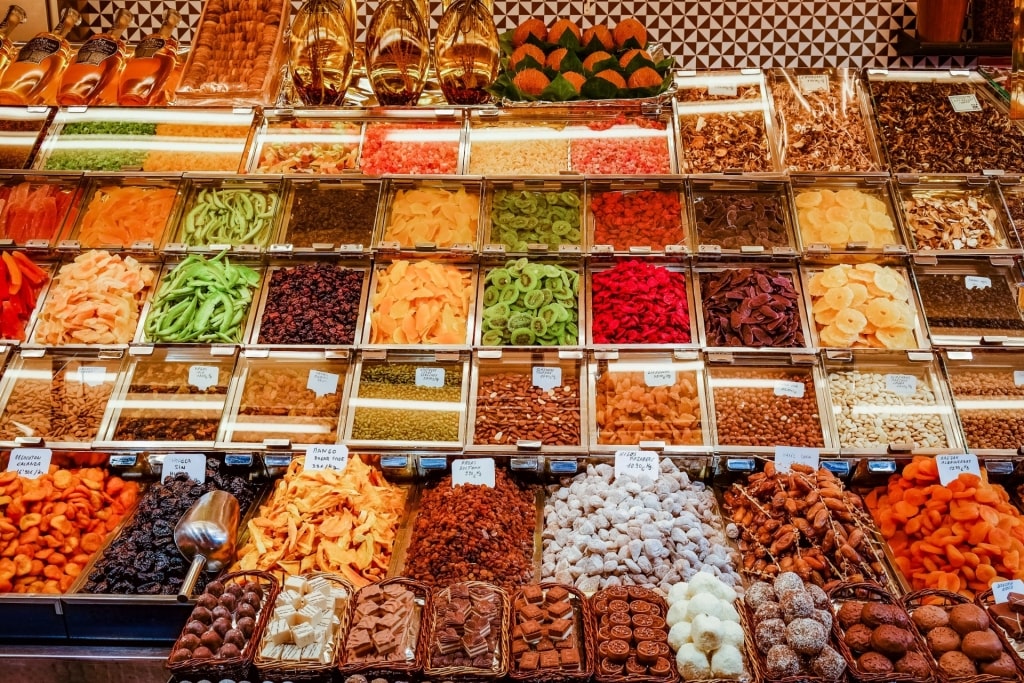
La Boqueria, Barcelona
For authentic Barcelona food, head to the famous La Boqueria, the city’s wondrous food market. Located on the opposite side of La Rambla from the Gothic Quarter, La Boqueria’s stalls are filled with produce from cured Iberico ham and oysters to cava and local cheeses.

Casa Milà, Barcelona
After, take in some of the extraordinary Gaudí architecture that makes Barcelona one of the best cities for art, including Güell Palace, Casa Batlló, Casa Milà, and La Sagrada Família. There are some brilliant museums to explore in Barcelona, too, including the Picasso Museum, the Barcelona Museum of Contemporary Art, and Museu Nacional d’Art de Catalunya.
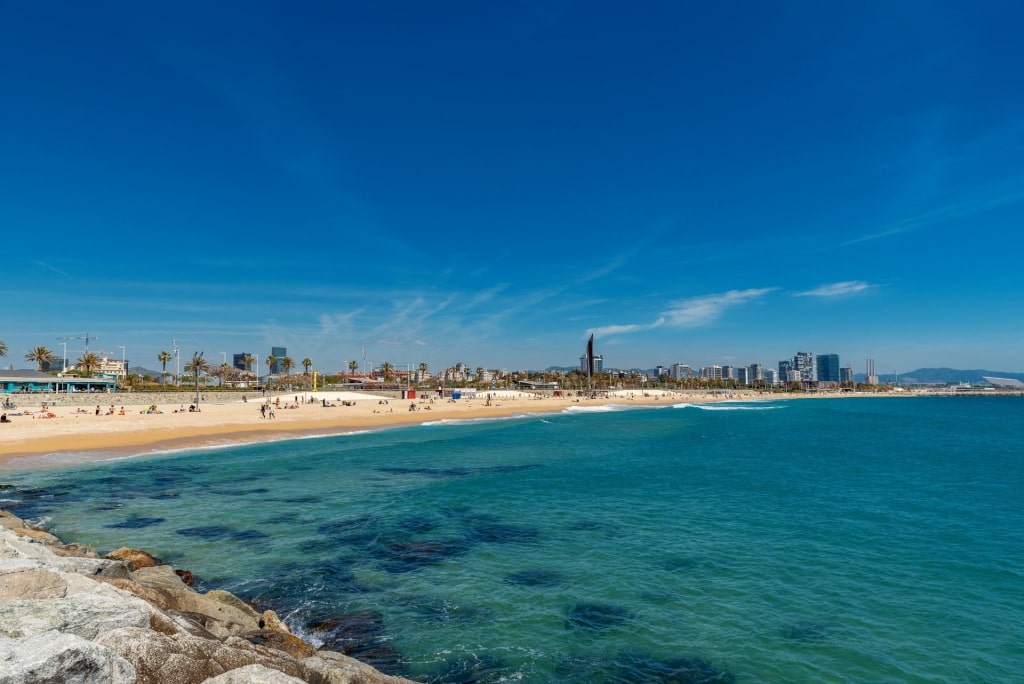
Playa de Bogatell, Barcelona
Alternatively, do as little as possible with a satisfying day lounging on one of Barcelona’s sandy beaches. There’s San Sebastian Beach nearest the port, Barceloneta Beach, lined with chiringuitos, or beach restaurants, or Playa de Bogatell for its proximity to the hip Poblenou neighborhood.
Read: Best Views in Barcelona
Málaga

Gibralfaro Castle, Málaga
Begin your exploration of Málaga at the Alcazaba Palace and the sunken Roman amphitheater. Situated at the foot of Gibralfaro hill, this Arab fortress is one of the largest in Andalusia, with battlements, turrets, and arrow slits.
Walk the Coracha—the double-walled passage connecting the Alcazaba and Gibralfaro Castle—and trace the remains of Roman walls.
The 10th-century Gibralfaro Castle is perched on the edge of the Montes de Málaga mountain range, overlooking Málaga and the sparkling Mediterranean Sea.

Old Town, Málaga
Málaga’s old town is centered around the 16th-century Málaga Cathedral and is the best place to shop for Spanish souvenirs such as sherry, olive oil, and flouncy flamenco dresses.

Playa la Malagueta, Málaga
You could also embrace one of Málaga’s golden beaches. There are 16 to choose from—including Playa la Malagueta and Playa de la Caleta—lining this sun-soaked stretch of the Costa del Sol.
For a break from the sun, settle down for a delicious Andalusian meal of gazpacho (a chilled soup dish), fried fish, and garlic shrimp in Soho, the vibrant neighborhood between the old quarter and the waterfront.
San Sebastian
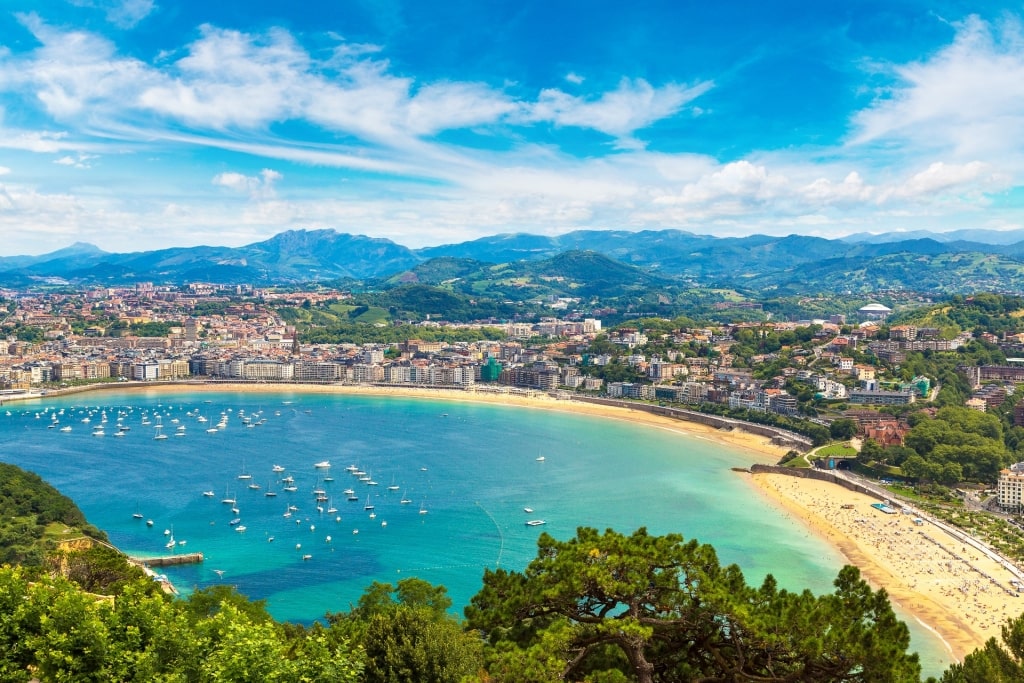
San Sebastian
San Sebastian’s ravishing seafront makes it one of the best cities to visit in Spain. Situated on Spain’s north coast—one-hour east of Bilbao and a short drive from the French border—San Sebastian lies around a horseshoe-shaped bay.
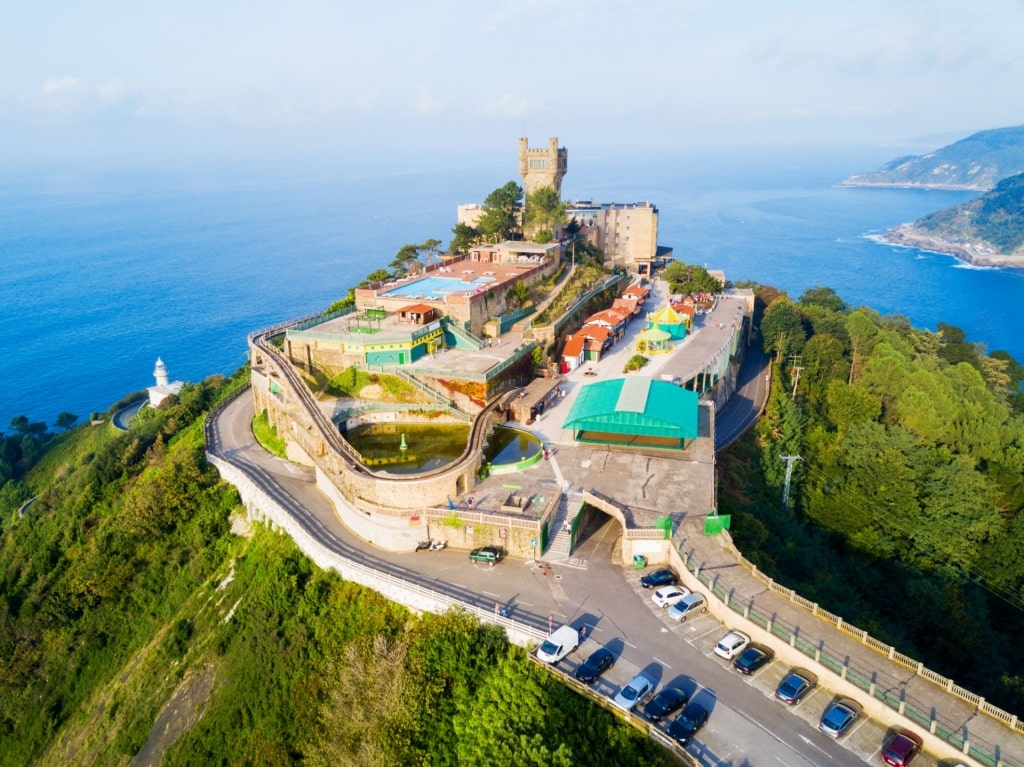
Monte Igueldo Park
To the western side of the bay, the resort’s vintage funicular, operational since 1912, climbs almost 500 feet to Monte Igueldo park. Enjoy the leisurely ride to the summit for fantastic views of San Sebastian and the unfolding Guipuzcoa landscape.
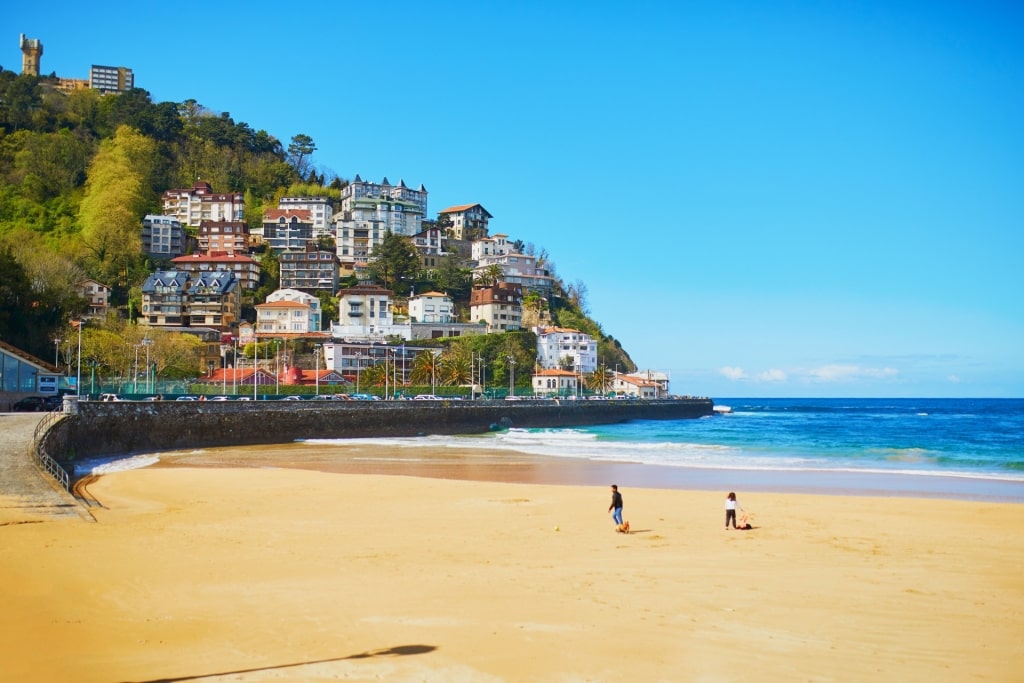
La Concha, San Sebastian
Walk the elegant promenade that sweeps around La Concha and Ondarreta beaches. During summertime, it’s possible to swim from the shore to Santa Clara, a small rocky outcrop that lies in the bay.
San Sebastian’s old town lies on the eastern tip of the bay. Here, you’ll find tightly packed pintxos bars (the north’s answer to tapas) and the porticoed Plaza de la Constitución.
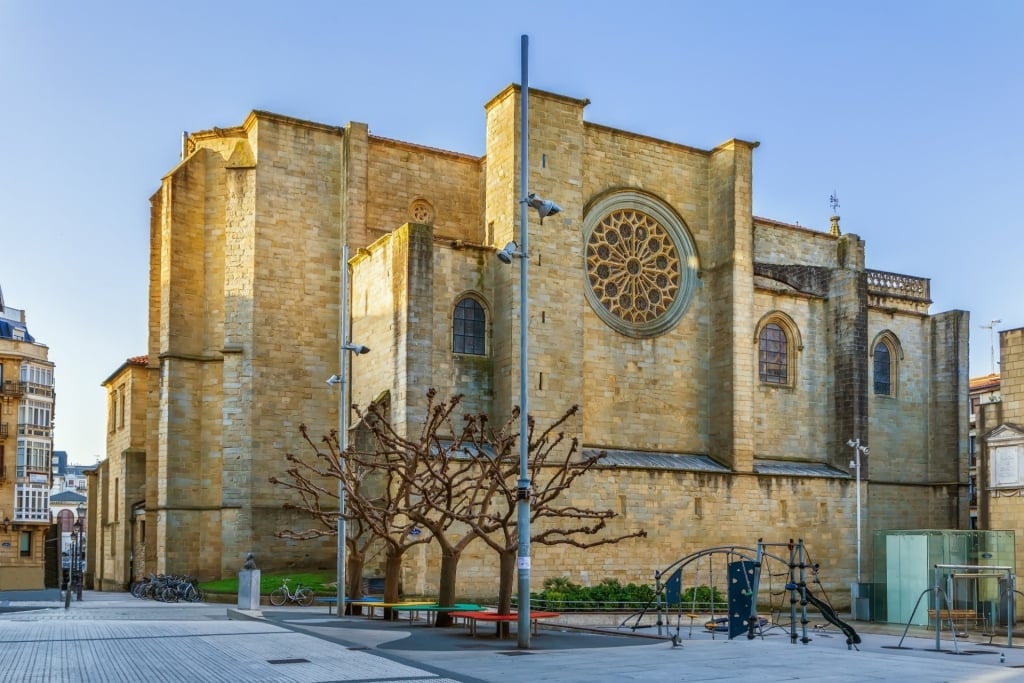
San Vicente, San Sebastian
Step inside the Gothic San Vicente, the oldest church in the city, and the renaissance-baroque Santa María Church to admire their jaw-dropping architecture. A top spot is the San Telmo Museum—set in a former Dominican convent—for studying its archaeological and ethnographic finds from the region.
Once you’ve walked the city, relax with a selection of San Sebastian’s world-famous pintxos dishes, such as salt cod, Iberico ham, garlicky mushrooms, and stuffed mussels.
Valencia
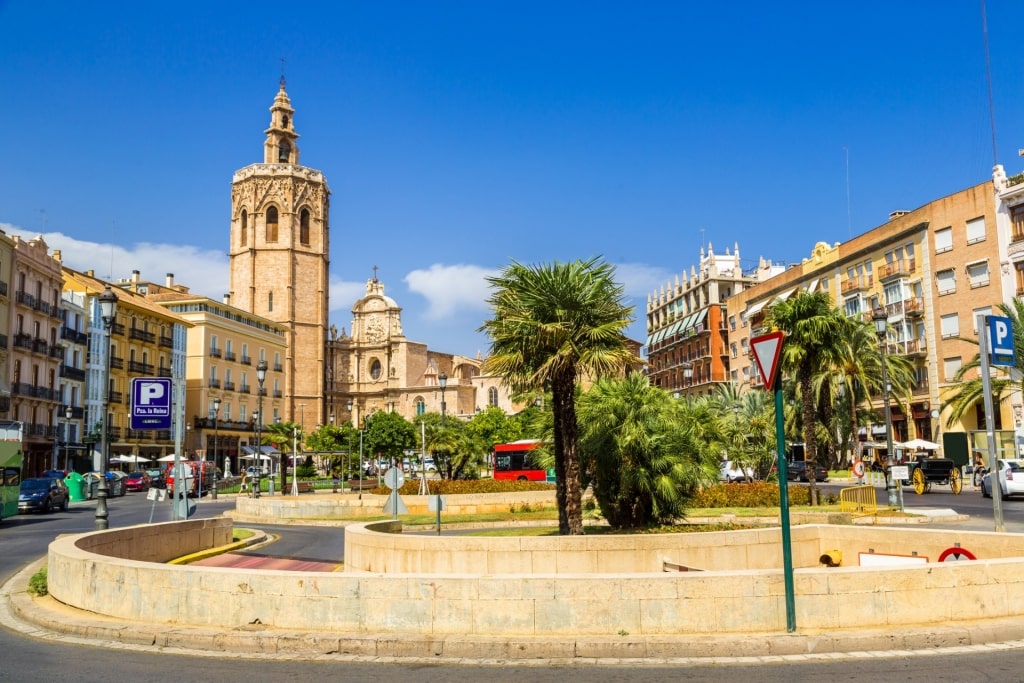
Old Town Valencia
The birthplace of paella is a standout Spanish city for travelers looking for an exciting blend of gastronomy and culture. Head to the star attraction of Valencia, the futuristic Ciudad de las Artes y las Ciencias—the City of Arts and Sciences—near the seafront.
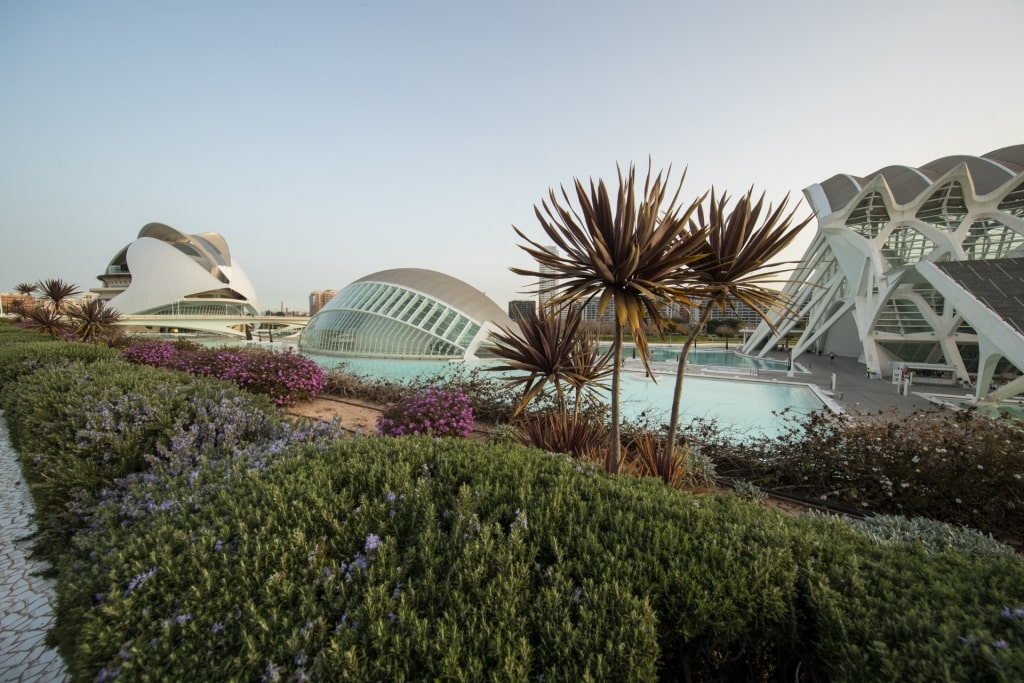
City of Arts and Sciences, Valencia
This architectural complex was designed by Santiago Calatrava and Félix Candela, set in a recessed patch of land where the Turia River once flowed before it entered the Mediterranean Sea.
You could easily lose a full day to the City of Arts and Sciences and its sprawl of Spanish museums and educational attractions.

Hemisfèric in City of Arts and Sciences, Valencia
Marvel at the spectacular Hemisfèric building, housing an IMAX and 3D cinema. Witness some of the 500 different species at Oceanogràfic, one of the largest aquariums in Europe, including walruses, sharks, seals, dolphins, belugas, and sea lions.
The interactive Science Museum features a program of exhibitions, while Umbracle is a large open garden dotted with modern sculptures and Mediterranean plants.
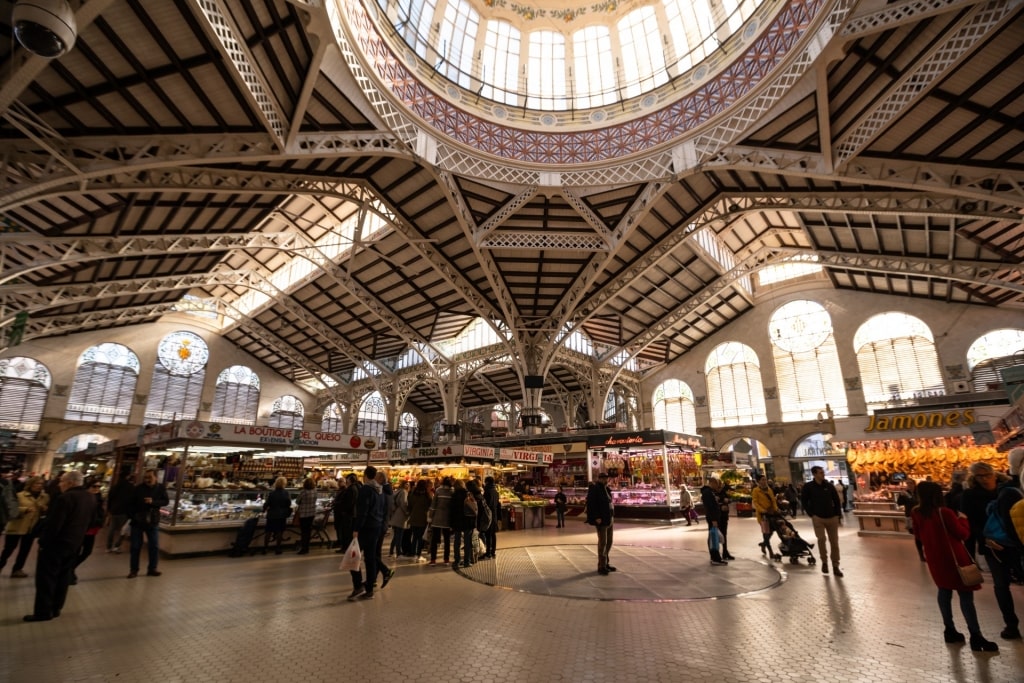
Central Market of Valencia
Don’t miss a visit to the city’s vibrant Central Market of Valencia, too. Set within an art deco building in Valencia’s Old Town, around 1,200 stalls are brimming with spices, nuts, cheeses, meats, fish, and an enormous quantity of fresh fruit and vegetables.
Take a seat at the market’s Central Bar, which is overseen by renowned Valencian chef Ricard Camarena. Here, you could feast on some of the exquisite dishes that Spain is known for, such as cuttlefish with aioli, cod fritters, and a salad of juicy Valencian tomatoes washed down with local wines.
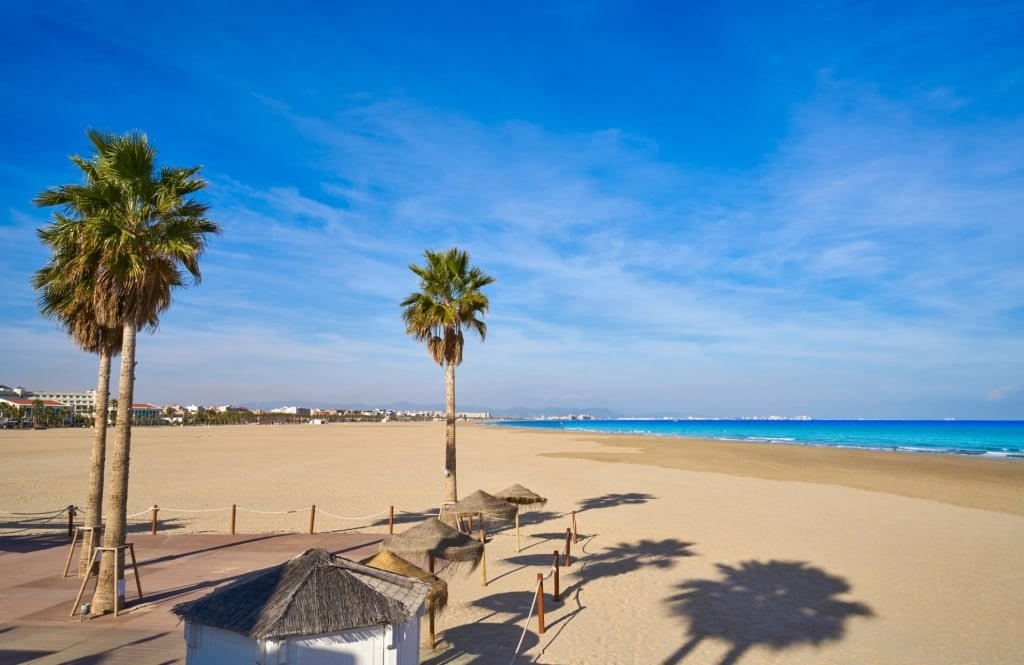
Malvarrosa Beach, Valencia
Take some time to stop at one of Valencia’s beaches, like Platja de Llevant, Malvarrosa beach, and Platja de la Patacona, which are perfect for swimming and sunbathing.
Ibiza Town
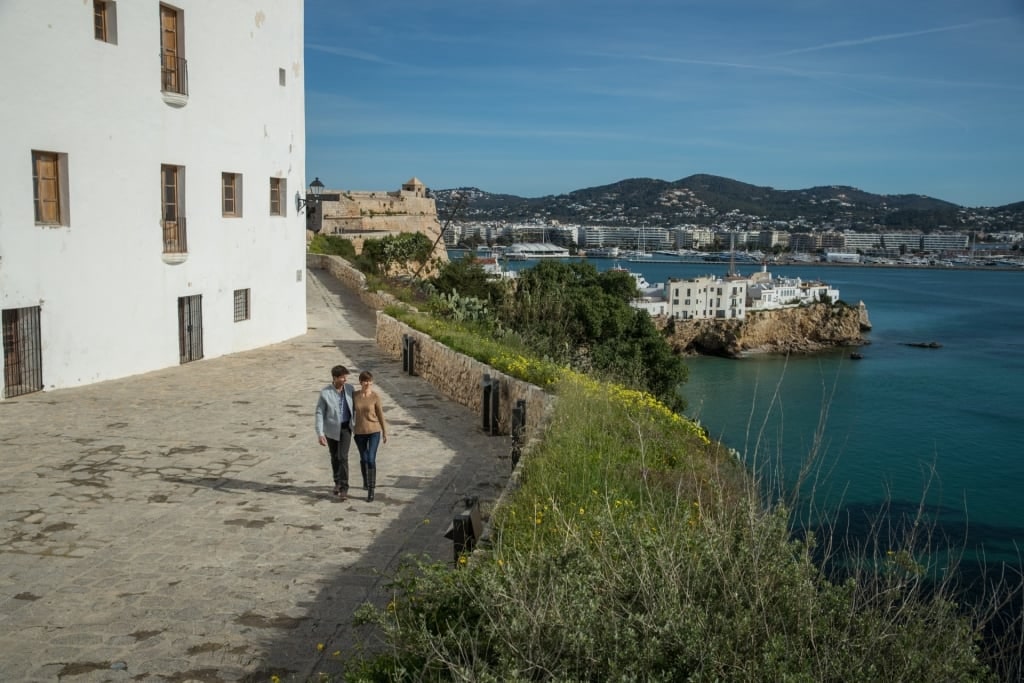
Dalt Vila, Ibiza Town
Ibiza has lured travelers for thousands of years. Most recently, though, this gleaming island has drawn a bohemian crowd for its artsy markets, shimmering beaches, and extravagant nightclubs.

Cathedral of Santa María de las Nieves, Ibiza Town
The city is centered around Dalt Vila, meaning “high town”, the hilltop old quarter with a fortified castle. Delve into the history of this Spanish island on a visit to the Cathedral of Santa María de las Nieves or the Town Hall; the latter is located within a former Dominican monastery.
For a modern take on Ibiza, the Contemporary Art Museum of Eivissa houses a wonderful 20th-century collection featuring artists such as Antoni Tàpies and Enric Miralles.
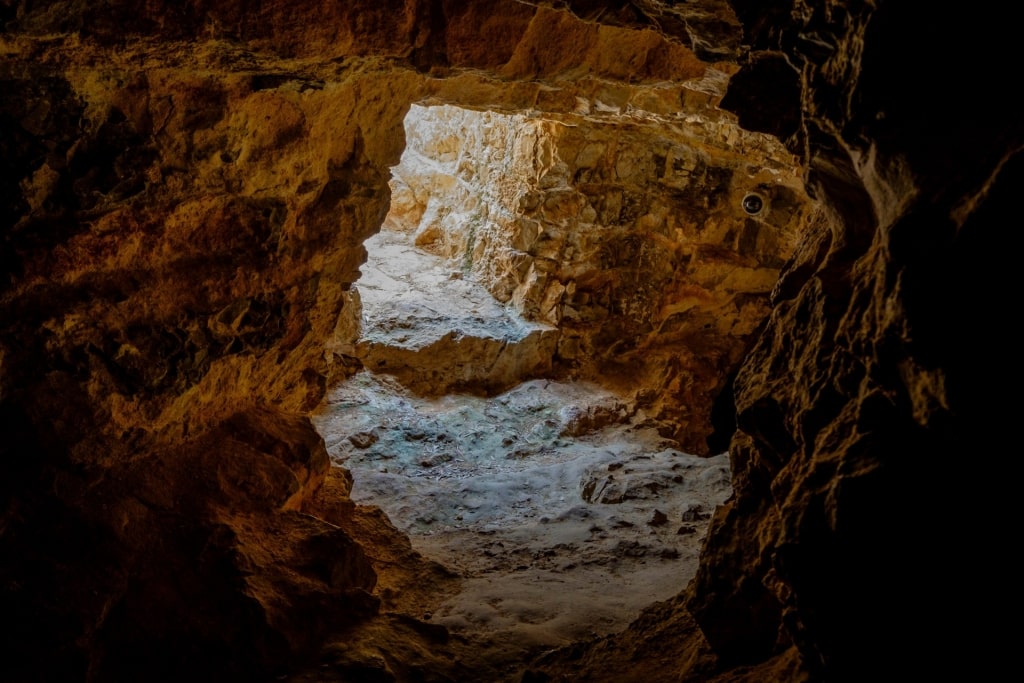
Puig des Molins
To explore further back in time, pay a visit to the Puig des Molins archaeological site at the Monographic Museum. Part of the city’s Archaeological Museum of Ibiza and Formentera, it’s set around a well-preserved necropolis with a large cemetery dating to the seventh century BC, just outside of Ibiza’s Old Town.
While the old town has some fabulous historical landmarks, one of the best things to do in Ibiza is to stroll among the whitewashed townhouses of the old town and browse the chic boutiques. After, enjoy a refreshing cocktail or chilled beer in a sun-dappled courtyard or side-street bar.
Cartagena
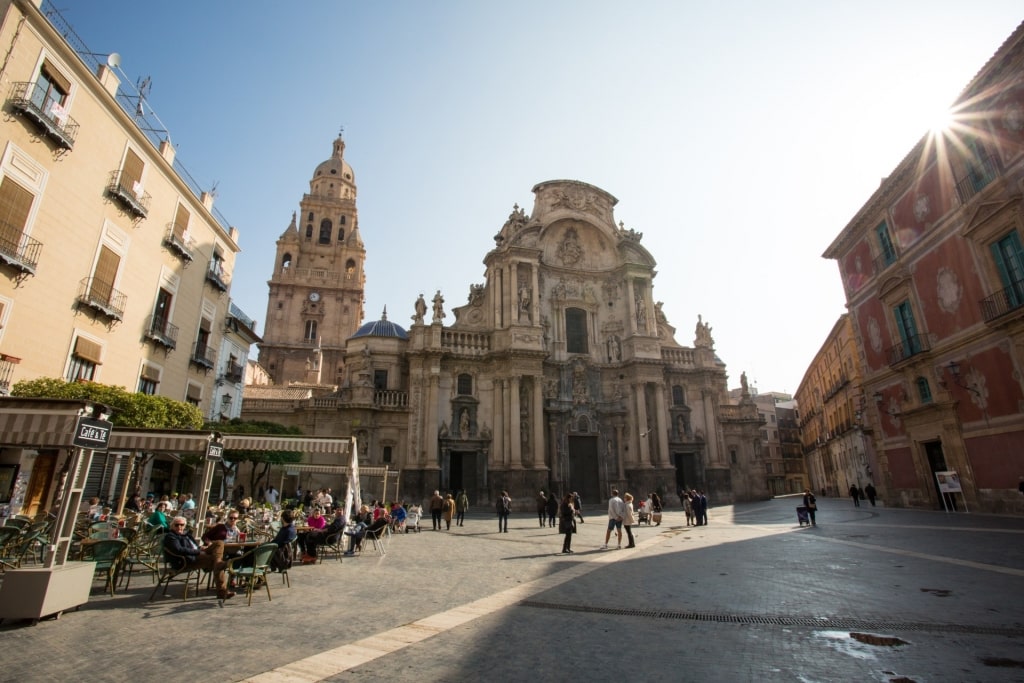
Cathedral of Murcia, Cartagena
On Spain’s Murcia coast, Cartagena effortlessly rises to its reputation as one of the best cities in Spain, thanks to its well-preserved antiquities.
Cartagena was conquered and inhabited by the Carthaginians, the Romans, and the Arabs until it was absorbed into the kingdom of Castile when retaken by Ferdinand III in 1245.
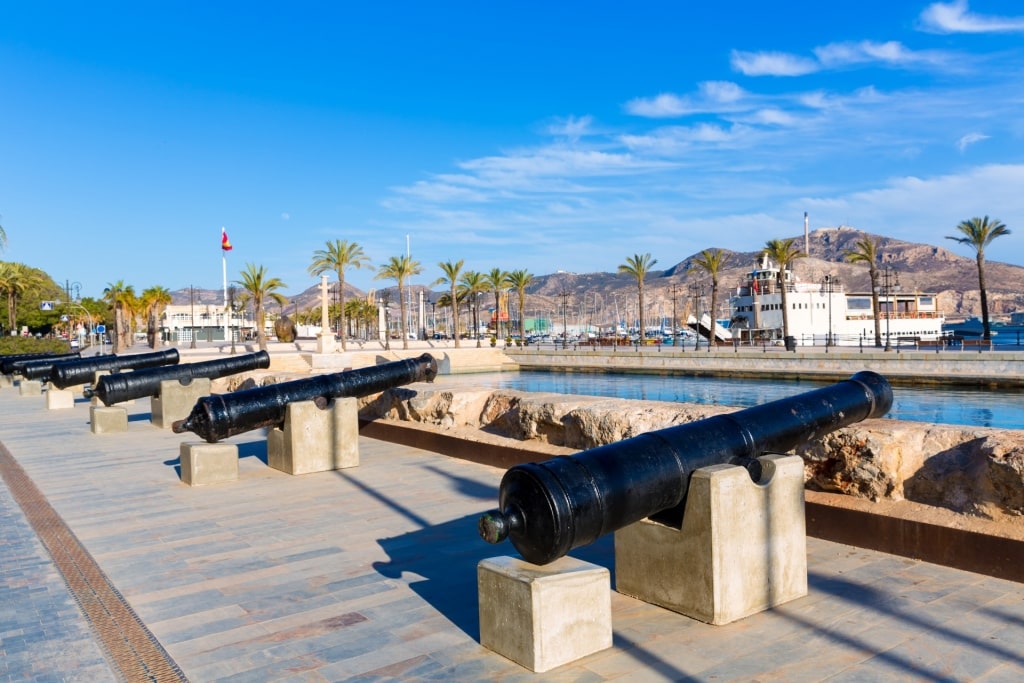
Naval Museum, Cartagena
Unwavering fans of Cartagena will argue that the city is home to Spain’s best museums. Choose from The Civil War Museum, the Naval Museum, or the Modern Art Museum.
Stroll around the waterfront near the marina and you’ll also find the fascinating National Museum of Underwater Archaeology. If you’ve ever wondered about shipwrecks and treasures found underwater, this is the place to learn more.
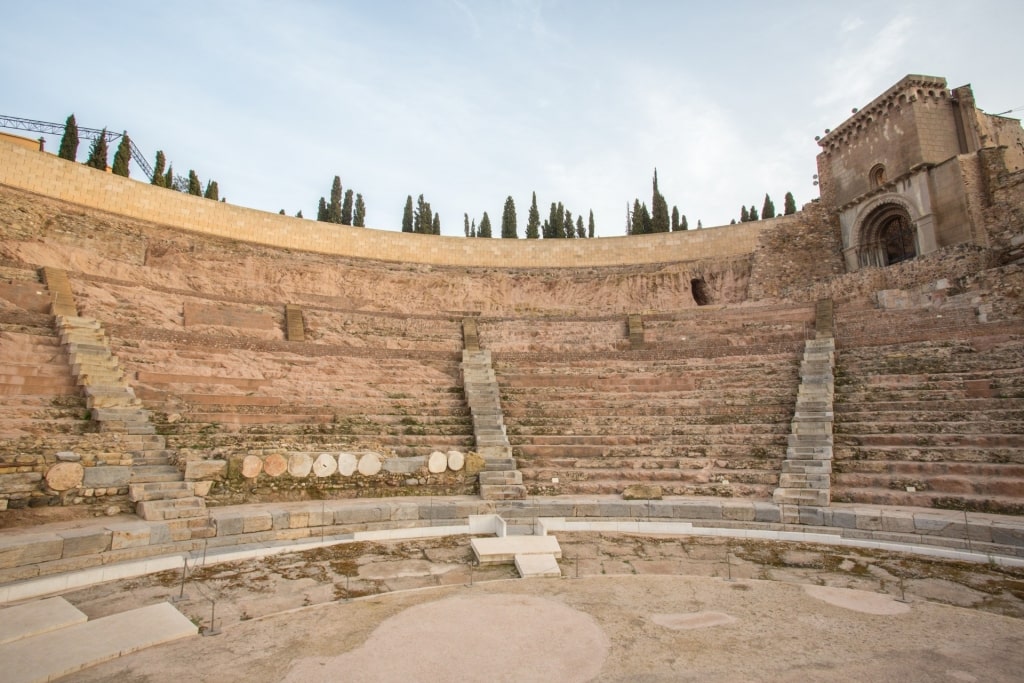
Roman Theater
Astonishingly, Cartagena’s showpiece—the first-century Roman theater in the heart of the city—was only discovered in 1987. The Museum of the Roman Theater will tell you all you need to know about this period in Cartagena’s history with artifacts on show including ceramics, jewelry, and coins.

Castillo de la Concepción, Cartagena
Walk to Castillo de la Concepción, atop Parque Torres, for fantastic views of the port and the Roman theater, over which it looms. There’s also the 18th-century Castle of La Atalaya, perched even higher at 794 feet above Cartagena on Atalaya Mountain.
Palma De Mallorca
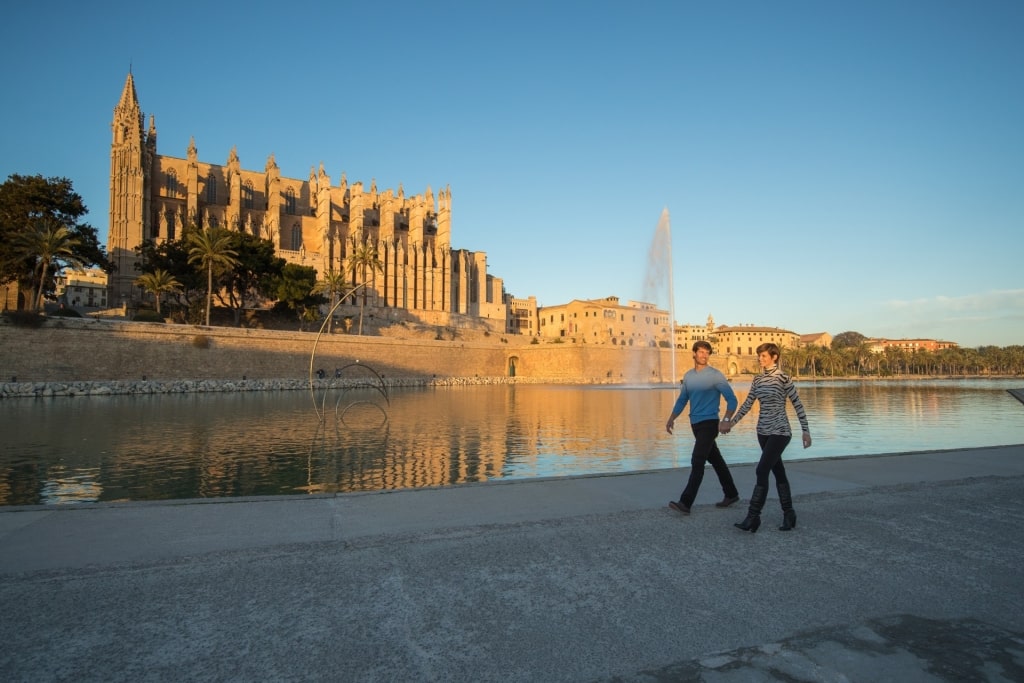
Palma De Mallorca
Palma de Mallorca is the capital of Mallorca, the largest of Spain’s Balearic Islands in the Mediterranean Sea.
One of the best cities in the Mediterranean, Palma lies between gorgeous green mountains and aquamarine waters and is filled with upmarket cafés and restaurants, not to mention some of Europe’s cultural highlights.
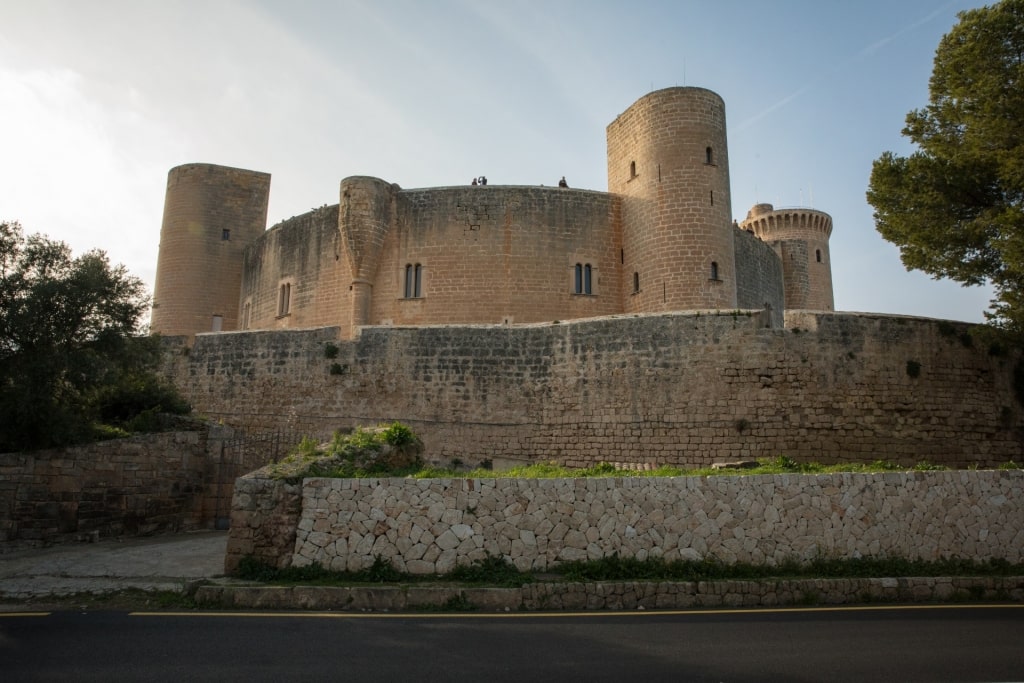
Bellver Castle, Palma De Mallorca
Spend the day exploring the Royal Palace of La Almudaina, the Cathedral of Santa Maria of Palma, and Bellver Castle, one of the best castles in Spain.
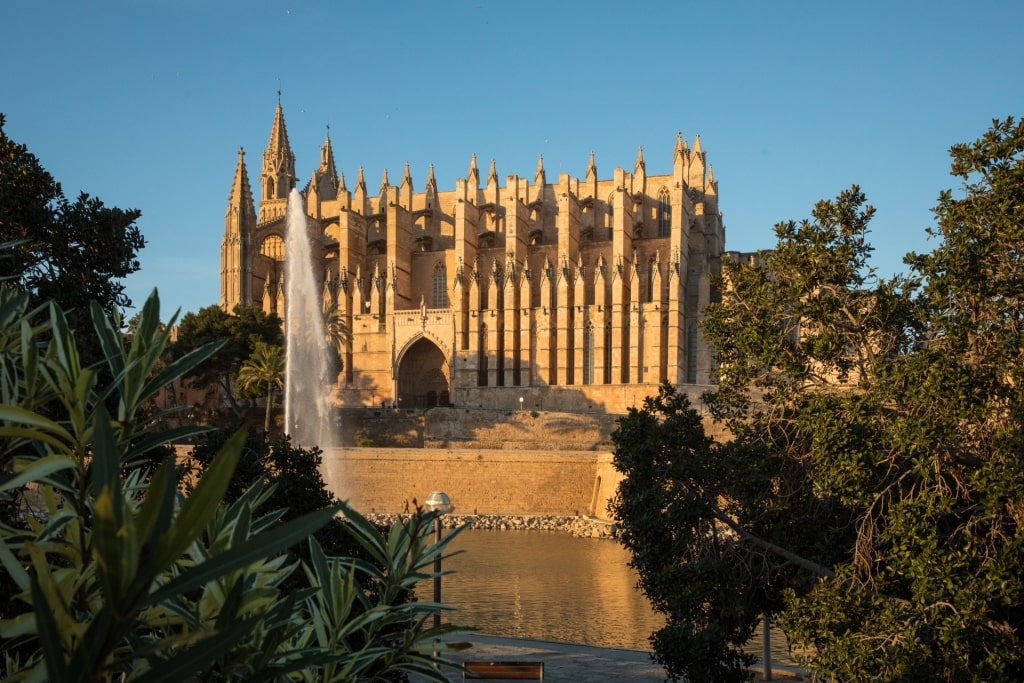
La Seu, Palma De Mallorca
The splendid waterfront cathedral, commonly referred to as La Seu, leaves many travelers misty-eyed for its remarkable gothic architecture.
One of the 13th-century church’s most famous features is its large rose window. Stroll along the palm tree-lined waterfront and you’ll catch sight of the magnificent glowing window from the outside.
Palma’s old quarter is densely packed with Spanish landmarks and museums. Visit the Museum of Mallorca to gain a deeper insight into the island’s backstory. The hauntingly beautiful Arab Baths, dating from the 10th century, is the place to see the only remains of Palma’s Arabic period.

Basílica de San Francisco, Palma De Mallorca
Close by, the 13th-century Basílica de San Francisco is another beautiful Spanish church, while Museu Fundació Joan March is a joyous modern art museum.
As far as Mallorca’s beaches go, Palma’s Platja de Can Pere Antoni is one of the best in Spain, offering all of the facilities you’ll need for a pleasurable day at the seaside.
Seville
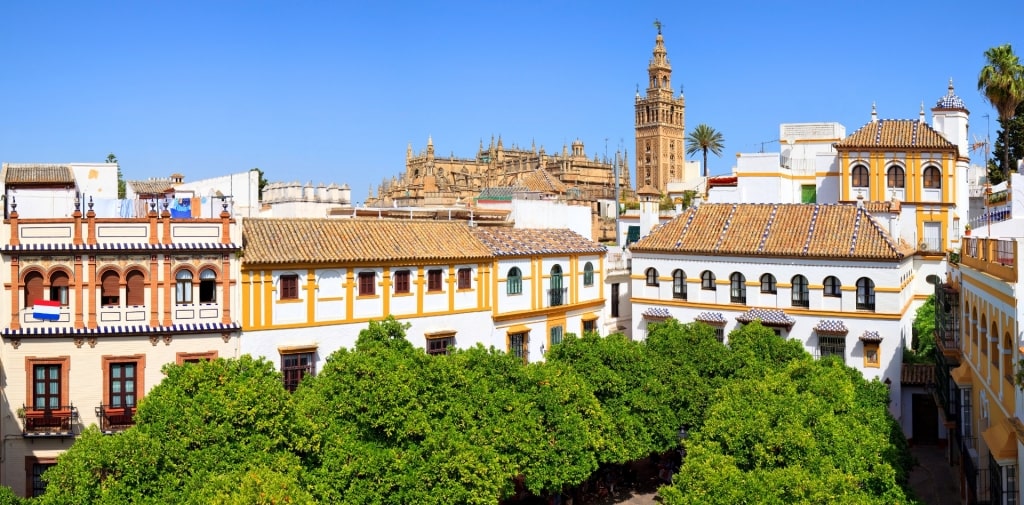
Barrio de la Cruz, Seville
Few places nourish the soul like the capital of Andalusia, one of the best cities in Spain for its dazzling flamenco scene and extraordinary palaces and churches.
There’s plenty to see and do in this storied city in Southern Spain, with much of it involving admiring period architecture. Tour the beating heart of Seville, Barrio de la Cruz, the old Jewish Quarter, where the narrow streets are filled with attractive whitewashed houses and squares lined with orange trees.

Royal Alcázar of Seville
You’ll find the Royal Alcázar of Seville in Barrio de la Cruz. Wander among its tranquil gardens and courtyards, and marvel at the elaborate arches and beautiful Moorish architecture.
Stop by Seville Cathedral, built on an earlier mosque, to see Columbus’ tomb and climb Giralda bell tower, the church’s former minaret.
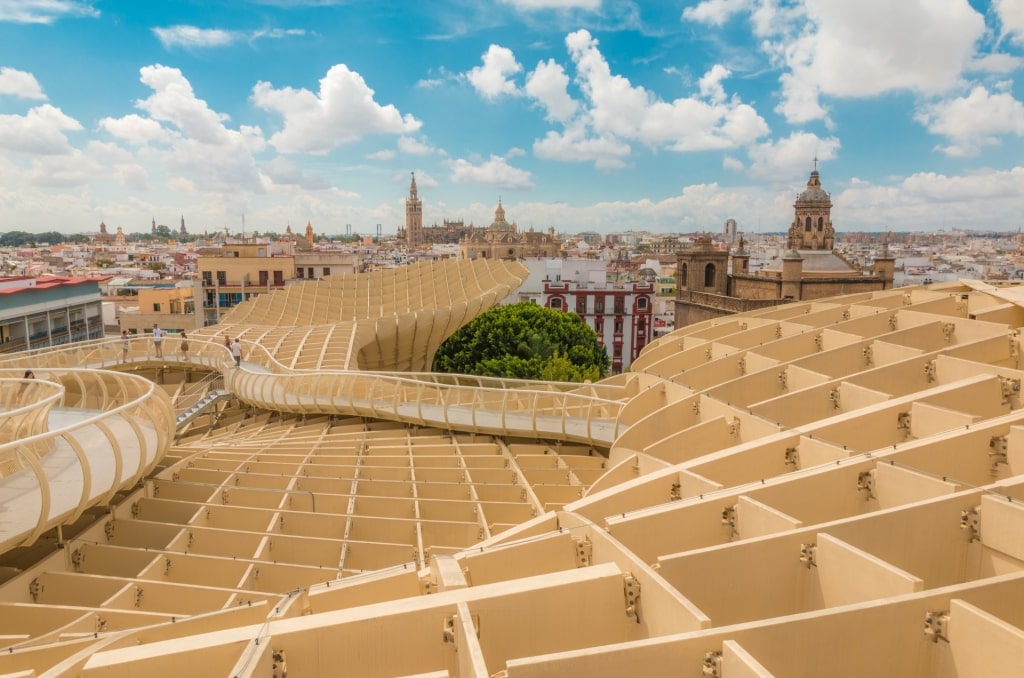
Metropol Parasol, Seville
Metropol Parasol, also known as Las Setas, is a modern masterpiece of Seville, featuring six mushroom-shaped wooden parasols in Plaza de la Encarnación.
Take the elevator to the fifth-level viewing platform for fantastic views of one of the most beautiful cities in Spain. There’s also a tapas restaurant, market, and the Antiquarium Museum inside.

Flamenco Dance Museum Photo by Sefaradia on Wikimedia Commons, licensed under CC BY-SA 4.0
The Flamenco Dance Museum is the best place to immerse yourself in Seville’s music and dance culture. Dance classes and live shows also take place here.
Once you’ve walked the city, seek out El Rinconcillo, the oldest bar in Seville, open since 1670. Relax at the bar with a glass of sherry, typical of the region.
Santa Cruz de Tenerife
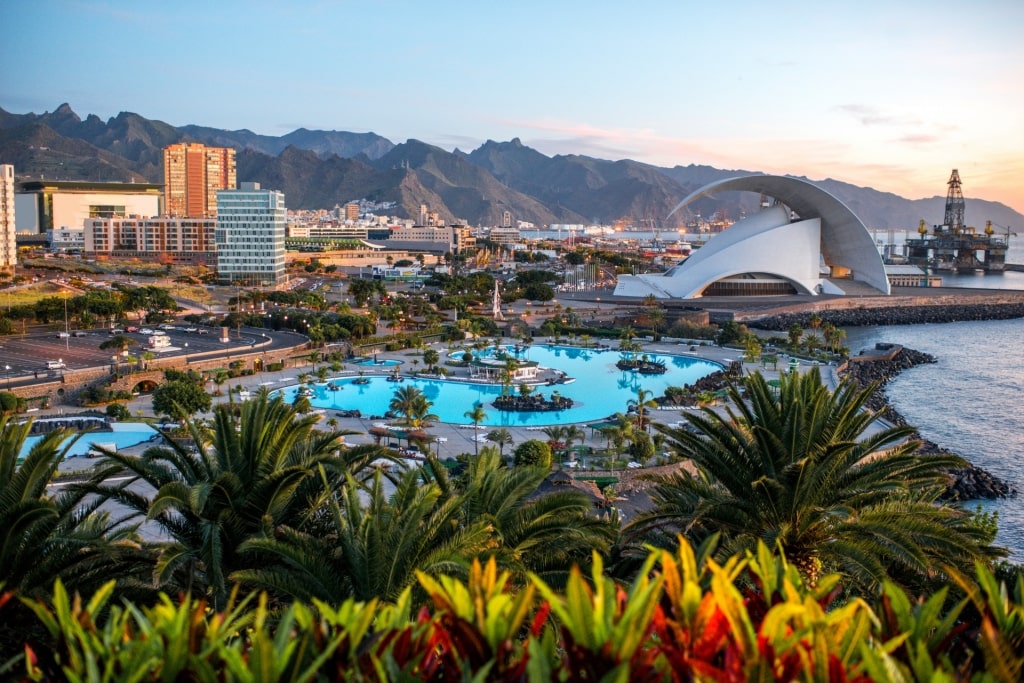
Santa Cruz de Tenerife
The capital of Tenerife is the perfect size to explore in one day. While the island itself is famed for the towering volcano, Mount Teide, Santa Cruz de Tenerife is known for its lively annual Carnival, wide boulevards, and leafy squares.

Auditorio de Tenerife Adán Martín, Santa Cruz de Tenerife
One of the best things to do in Tenerife is to marvel at the oceanfront Auditorio de Tenerife Adán Martín. This striking building, another Santiago Calatrava masterpiece, faces the Atlantic Ocean and is designed with a curved, wave-like form.
Tenerife Symphony Orchestra and the Ópera de Tenerife are based at the Auditorio and there’s a sublime bistro, Alisios Café, for a light lunch.
You could also visit the museum and underground remains of the 16th-century Castillo de San Cristobal in Plaza de España.
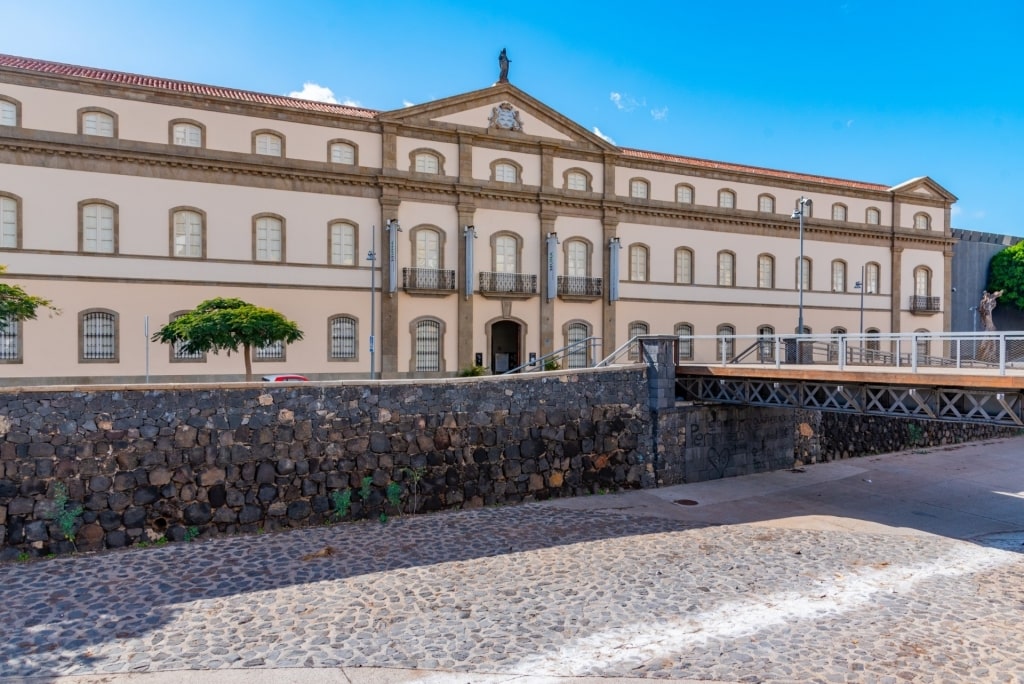
Museum of Nature and Archaeology, Santa Cruz de Tenerife
Santa Cruz de Tenerife’s Museum of Nature and Archaeology in the old Civil Hospital is a great spot for exploring early Canary Islands life, including the native Guanches who lived in Tenerife before European settlers arrived.
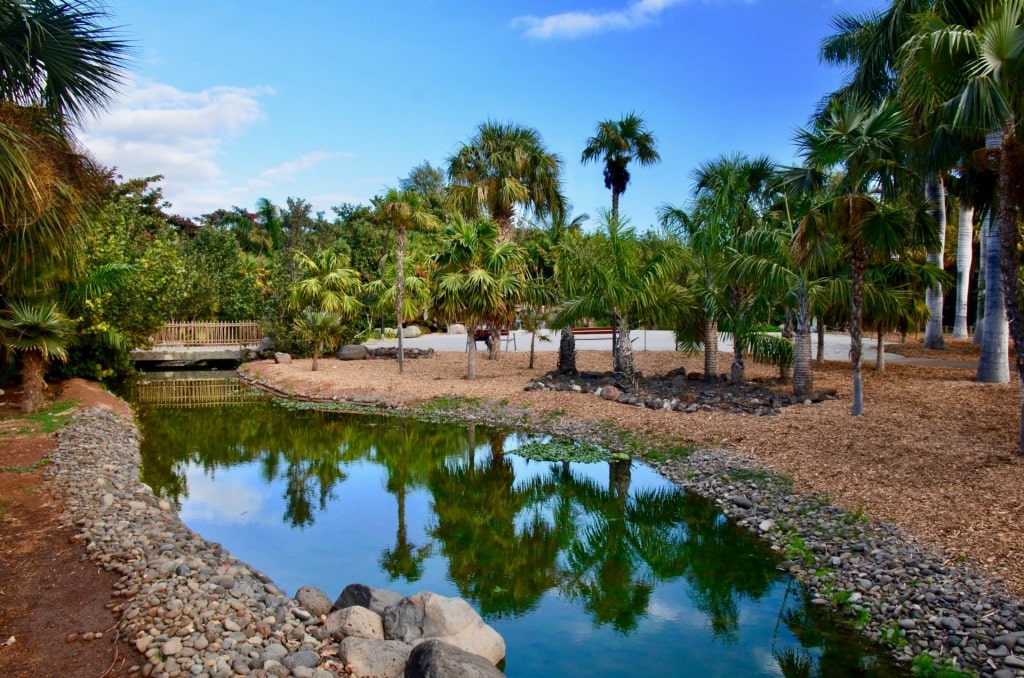
Palmetum, Santa Cruz de Tenerife
The city’s luscious Palmetum is another must-visit. Next to Parque Marítimo César Manrique, the verdant botanic garden is made up of almost 30 acres of palm trees and other sub-tropical plants with wonderful ocean views. Waterfalls, ponds, and streams meander among the 600 species of palm trees.
Read: Best Beaches in Tenerife

La Sagrada Família, Barcelona
Spain offers travelers rolling vineyards, miles of golden beaches, and awe-inspiring cities. To tick off several of the best cities in Spain in one culture-packed vacation, browse Celebrity’s cruises to Spain.



